写给考研英语很烂基础很差的人
给英语不好的朋友的建议英语作文

给英语不好的朋友的建议英语作文English:My advice to friends with poor English skills in writing English compositions would be to start by practicing basic grammar and sentence structure. It's important to have a solid foundation in English language rules in order to effectively convey ideas in writing. Reading English content, such as books, articles, and essays, can also help to improve vocabulary and provide examples of proper sentence structure and grammar usage. It's also beneficial to practice writing on a regular basis, whether it's journal entries, short stories, or even just summarizing daily activities in English. Seeking feedback from English-speaking friends or teachers can also provide valuable insight and guidance for improvement. Additionally, using online resources and English writing tools can help identify and correct common mistakes. Lastly, patience and persistence are key in improving English writing skills, so don't be discouraged by initial challenges, but rather see them as opportunities for growth and improvement.中文翻译:我给英语写作能力较差的朋友的建议是要从基础语法和句子结构开始练习。
英语能力缺乏的弊端英语作文
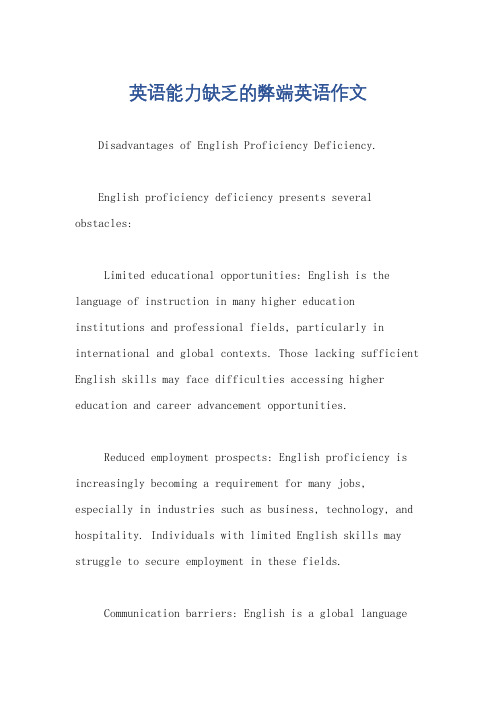
英语能力缺乏的弊端英语作文Disadvantages of English Proficiency Deficiency.English proficiency deficiency presents several obstacles:Limited educational opportunities: English is the language of instruction in many higher educationinstitutions and professional fields, particularly in international and global contexts. Those lacking sufficient English skills may face difficulties accessing higher education and career advancement opportunities.Reduced employment prospects: English proficiency is increasingly becoming a requirement for many jobs, especially in industries such as business, technology, and hospitality. Individuals with limited English skills may struggle to secure employment in these fields.Communication barriers: English is a global languageused for communication worldwide. Individuals with poor English proficiency may experience difficulties in communicating with others, limiting their social interactions and opportunities.Cognitive and psychological challenges: Language proficiency has been linked to cognitive benefits such as improved memory, problem-solving, and critical thinking. Those lacking English proficiency may miss out on these cognitive enhancements. Additionally, language deficiencies can lead to feelings of inadequacy and low self-esteem.Social isolation: English proficiency can facilitate social connections and integration into society.Individuals with limited English skills may feel excluded from social groups and activities that require English communication.Economic disadvantages: In the globalized economy, English proficiency is often a prerequisite for higher-paying jobs and opportunities. Those with poor English skills may experience economic disadvantages and havedifficulty competing in the job market.中文回答:缺乏英语能力的弊端。
基础太差,考研英语二应该怎么复习

基础太差,考研英语二应该怎么复习很多同学都听别人说过这样的话吧:基础不好你就做真题啊,做上十几套真题肯定能考好。
这其实是无稽之谈!考研英语的难度大家很清楚,如果基础不好做真题,先不说文章是否读得懂,翻译是否能做出来,仅仅是读题干,都是很有困难的,这样做题,做100套能有多大的长进呢?所以,我对英语基础不好的同学的建议是,精做真题,基础优先。
一、词汇语法:取之于真题,用之于考题词汇和语法从来都不是考研英语单独考察的项目,只是为了各种题型服务的。
把考研考题/真题比作顾客,词汇书和语法书是菜单。
你把菜单全背会有什么用呢?每一样菜品都是“顾客”需要的吗?拿着真题学词汇和语法是最好的,按照“顾客”的口味去提供菜品,效率高,效果也更好啊。
先精读文章然后做题,顺便学习其中的词汇和语法。
把近十年的真题词汇和语法全部掌握,做题基本就不会有任何难度。
英语基础不好的同学,如果觉得精读真题太费时间,可以买一本逐句精解的真题。
我了解了市面上很多种受大家青睐的真题,发现吕升运的《考研圣经》在这方面做的特别好,词汇和语法注解的很细,对考点把握的也比较精准,基本文中的词汇语法注解,加上该真题做的一些拓展,就是全部的考研英语核心考点了。
二、各题型突破:方法重于理论,实践大于经验任何从别处借鉴的复习经验都是别人的,只有经过认真的做题,结合自己的切身体会去总结,将知识点和考点融会贯通,才能算是达到好的复习效果了。
对于很多真题的解析模式,也存在很多不科学的地方。
有些真题着重于讲理论性的知识点,但缺少做题的具体方法,这样是很不利于我们复习的。
在复习过程中要记得,坚持方法大于理论。
对于不同的题型,一定要善于总结做题套路,比如说,阅读题最高效的做题方法:先浏览题干,确定考点,是态度题还是观点题?是例证题还是主旨题?然后进行回文定位;将文章中的相关句子划出来(有时需要同义替换和判断推理),看哪个选项符合原文意思。
完形填空,无非就是考近义词辨析,固定搭配等等,平时多多积累相关词汇,考试时结合上下文选择就好。
英语能力缺乏的缺点英语作文
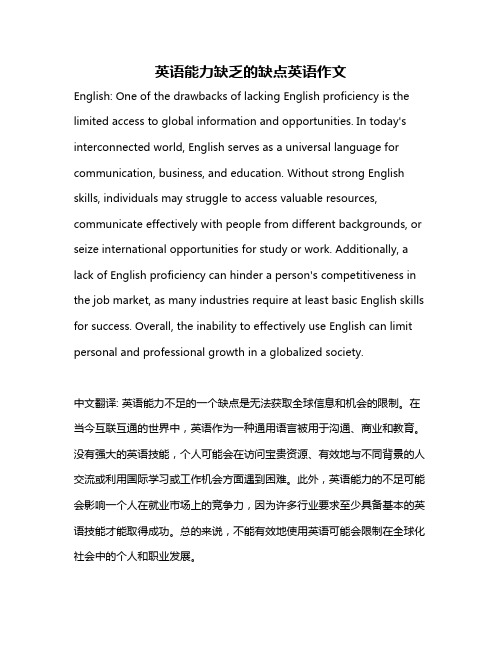
英语能力缺乏的缺点英语作文English: One of the drawbacks of lacking English proficiency is the limited access to global information and opportunities. In today's interconnected world, English serves as a universal language for communication, business, and education. Without strong English skills, individuals may struggle to access valuable resources, communicate effectively with people from different backgrounds, or seize international opportunities for study or work. Additionally, a lack of English proficiency can hinder a person's competitiveness in the job market, as many industries require at least basic English skills for success. Overall, the inability to effectively use English can limit personal and professional growth in a globalized society.中文翻译: 英语能力不足的一个缺点是无法获取全球信息和机会的限制。
在当今互联互通的世界中,英语作为一种通用语言被用于沟通、商业和教育。
给英语不好的同学提建议 英语作文
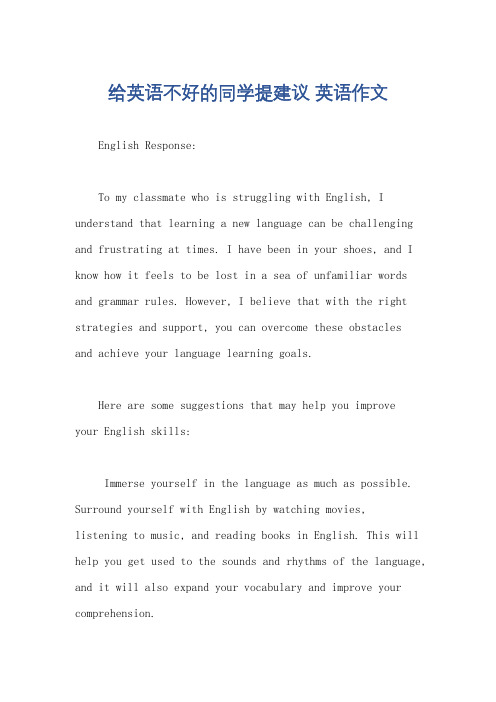
给英语不好的同学提建议英语作文English Response:To my classmate who is struggling with English, I understand that learning a new language can be challenging and frustrating at times. I have been in your shoes, and I know how it feels to be lost in a sea of unfamiliar words and grammar rules. However, I believe that with the right strategies and support, you can overcome these obstaclesand achieve your language learning goals.Here are some suggestions that may help you improveyour English skills:Immerse yourself in the language as much as possible. Surround yourself with English by watching movies,listening to music, and reading books in English. This will help you get used to the sounds and rhythms of the language, and it will also expand your vocabulary and improve your comprehension.Don't be afraid to make mistakes. Everyone makes mistakes when learning a new language. The important thing is to learn from your mistakes and keep practicing. Don't let the fear of making mistakes hold you back from speaking or writing in English.Find a language partner. Practicing with a native speaker or another learner can be a great way to improve your conversation skills and get feedback on your pronunciation and grammar. You can find language partners through online forums, social media, or local language exchange groups.Use online resources. There are many helpful online resources available for English learners, such as grammar exercises, vocabulary lists, and pronunciation guides. Take advantage of these resources to supplement your learning.Don't give up. Learning a new language takes time and effort. There will be times when you feel frustrated and discouraged, but it is important to keep going. Rememberyour goals and stay motivated. With perseverance and hard work, you will eventually achieve fluency.中文回答:给英语不好的同学的建议。
给英语成绩不好的朋友的建议作文

给英语成绩不好的朋友的建议作文English Answer:Dear friend,。
I understand that you're struggling with your English grades, and I'm here to help. First, it's important to remember that everyone learns differently, so don't compare yourself to others. Find what works for you and stick with it.Here are a few tips that may help:Set realistic goals. Don't try to improve your grade by 10% overnight. Start with small, achievable goals and gradually work your way up.Practice regularly. The more you practice, the better you'll become. Try to set aside some time each day to practice your English, even if it's just for 15 minutes.Find a study buddy. Studying with a friend can be a great way to stay motivated and accountable. You can quiz each other, help each other with homework, and discuss the material.Take advantage of resources. There are many resources available to help you improve your English, such as online courses, tutor, and apps. Take advantage of these resources and use them to your advantage.Don't be afraid to ask for help. If you're struggling with a particular concept, don't be afraid to ask for help from your teacher, a tutor, or a friend.Remember, improving your English takes time and effort. Don't get discouraged if you don't see results immediately. Just keep practicing and you will eventually see improvement.I believe in you!中文回答:亲爱的朋友,。
给英语成绩不好的朋友的建议作文
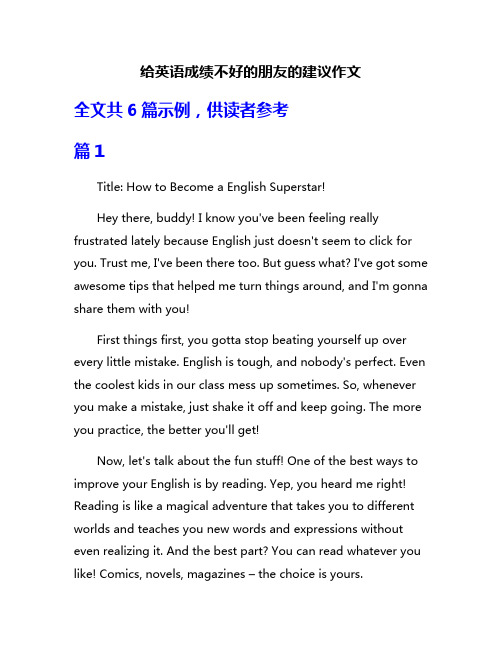
给英语成绩不好的朋友的建议作文全文共6篇示例,供读者参考篇1Title: How to Become a English Superstar!Hey there, buddy! I know you've been feeling really frustrated lately because English just doesn't seem to click for you. Trust me, I've been there too. But guess what? I've got some awesome tips that helped me turn things around, and I'm gonna share them with you!First things first, you gotta stop beating yourself up over every little mistake. English is tough, and nobody's perfect. Even the coolest kids in our class mess up sometimes. So, whenever you make a mistake, just shake it off and keep going. The more you practice, the better you'll get!Now, let's talk about the fun stuff! One of the best ways to improve your English is by reading. Yep, you heard me right! Reading is like a magical adventure that takes you to different worlds and teaches you new words and expressions without even realizing it. And the best part? You can read whatever you like! Comics, novels, magazines – the choice is yours.Another awesome tip is to watch movies and TV shows in English. Not only is it super entertaining, but you'll also get to hear how native speakers actually talk. Plus, you can practice your listening skills and pick up on slang and idioms. Just make sure to turn on the subtitles at first, so you don't miss anything.Speaking of listening, why not try listening to English music or podcasts? You can sing along or repeat the words you hear, and it's a great way to improve your pronunciation and vocabulary. Just be careful not to pick up any bad words from those rap songs, unless you want to get in trouble with the teacher!But you know what's even better than all of that? Having conversations with your English-speaking friends or family members. Don't be shy – ask them questions, share your thoughts, and let them correct you if you make mistakes. The more you practice speaking, the more confident you'll become.Oh, and don't forget about good old-fashioned flashcards! They might seem a bit old-school, but they're a tried and true method for memorizing new words and their meanings. You can even turn it into a game by challenging your friends or siblings to see who can learn the most words.Now, I know what you're thinking: "But English is so boring and difficult!" Well, my friend, that's where you're wrong. English can be super fun and exciting if you approach it with the right mindset. Instead of thinking about it as a chore, try to find ways to make it enjoyable.For example, you could watch your favorite cartoons or movies in English and try to pick up on the jokes and references. Or, you could write silly stories or songs using the new words and grammar rules you've learned. Heck, you could even create your own secret language with your friends using English words and phrases!And don't forget to celebrate your successes, no matter how small they may seem. Did you understand a joke in English for the first time? High five! Did you correctly use a new grammar rule in a sentence? Give yourself a pat on the back! Celebrating your achievements will keep you motivated and remind you of how far you've come.Last but not least, don't be afraid to ask for help when you need it. Your teachers and parents are there to support you, and they want you to succeed. If you're struggling with something specific, let them know, and they'll be more than happy to help you out.So, there you have it, my friend! Follow these tips, and you'll be speaking, reading, and writing in English like a pro in no time. Just remember to be patient with yourself, have fun, and never give up. You've got this!篇2Title: How to Get Better at English (Even When It's Really Hard)Hi there, my friend! I know you've been feeling really frustrated with English class lately. I can totally understand why –English can be super tricky and confusing sometimes. But don't worry, I'm here to share some tips that have helped me, and I'm sure they'll help you too!First things first, it's important to remember that learning a new language takes time and lots of practice. It's not going to happen overnight, and that's okay! Don't be too hard on yourself if you're finding it challenging. We all learn at our own pace, and that's perfectly fine.One thing that has really helped me is to make English a part of my daily life. Instead of just studying it in class, try to incorporate it into your everyday routine. For example, you could watch your favorite TV shows or movies in English (with subtitlesat first, if you need them). You could also listen to English music or podcasts while you're doing other things, like cleaning your room or getting ready for school.Another great tip is to read, read, and read some more! Reading is an excellent way to improve your vocabulary and grammar skills. Start with simple books or comics that you find interesting, and gradually work your way up to more challenging materials. Don't be afraid to use a dictionary or ask for help if you come across words or phrases you don't understand.Speaking of asking for help, don't be shy about doing that! Your English teacher is there to support you, so don't hesitate to ask them questions or request extra help if you need it. You could also team up with a classmate who is good at English and study together. Sometimes, having a study buddy can make all the difference.One thing that has really helped me is to create my own English study materials. For example, I like to make flashcards with new words and phrases, and then practice them regularly. You could also try writing short stories or journal entries in English, or even creating your own English-language comics or videos. The more creative you can be with your learning, the more fun and engaging it will be.Another great idea is to find opportunities to practice your English outside of the classroom. This could be as simple as striking up a conversation with an English-speaking friend or family member, or even joining an online English conversation group or club. The more you practice speaking and listening, the more confident and comfortable you'll become.Remember, everyone has their own strengths and weaknesses when it comes to learning. Don't compare yourself to others or get discouraged if you're not progressing as quickly as some of your classmates. Just focus on your own journey and celebrate your own progress, no matter how small it may seem.Finally, try to stay positive and have fun with it! Learning a new language is an incredible opportunity to explore a whole new world of culture, literature, and perspectives. Embrace the challenges and enjoy the process of discovery.I know it can be tough sometimes, but stick with it, my friend. With dedication, patience, and the right strategies, you'll get better and better at English every day. And before you know it, you'll be speaking, reading, and writing like a pro!Hang in there, and remember – I'm always here to support you and cheer you on. You've got this!篇3My Dear Friend,I know you're feeling really frustrated with your English grades lately, and I can understand why. English can be such a tricky language to learn, with all its weird rules and exceptions. But don't give up yet! I've been there too, and I want to share some tips that have helped me improve.First of all, try not to get too discouraged. Learning a new language is hard work, and it's okay if you don't get everything right away. The most important thing is to keep practicing and never stop trying. Every mistake you make is just a chance to learn something new.One thing that really helped me was reading a lot of English books and stories. At first, I found it super difficult to understand everything, but the more I read, the more familiar the words and sentence structures became. You could start with simple picture books or comics, and then work your way up to chapter books as you get better. Reading out loud can also help with pronunciation.Another great way to practice is by listening to English songs, watching movies or TV shows, and playing educational games orapps in English. Immersing yourself in the language like this makes it much easier to pick up common phrases and expressions that they don't always teach you in school.When it comes to studying vocabulary and grammar rules, I find it really helpful to use flashcards or make colorful posters to hang around my room. Writing out new words and definitions over and over again may seem boring, but it really does make them stick in your brain better. You could even turn it into a game by seeing how quickly you can quiz yourself.Don't be afraid to speak English out loud too, even if you're just practicing at home by yourself or with a parent. The more you use the language, the more natural and comfortable it will become. If you're feeling brave, you could start small conversations in English with your teacher or classmates too.Most importantly, be patient with yourself. Everyone learns at their own pace, and there's no need to compare yourself to others. As long as you're putting in the effort and trying your best, that's what really matters. English skills take time to develop, but they'll come if you stick with it.If you ever feel like you're struggling or need some extra support, don't hesitate to ask your teacher for help or even lookinto getting a tutor. There's no shame in needing a bit of extra guidance sometimes. We all have our strengths and weaknesses.I really believe in you, and I know you can do this! Just take it one step at a time, and don't put too much pressure on yourself. Keep working hard, keep practicing, and keep that positive attitude. Before you know it, English will start to feel like second nature.Your friend,[Your Name]篇4My Best Tips for Improving Your EnglishHi there! My name is Jamie, and I'm a 5th grader who loves learning English. I know some of my friends don't feel the same way though. A lot of kids in my class really struggle with English class. Maybe the grammar rules seem confusing, or remembering vocabulary words is tough, or reading out loud makes you nervous. I get it, English can definitely be challenging! But I've picked up some helpful tips over the years that have really boosted my English skills. I want to share my advice with you so English doesn't have to be so hard anymore!First off, don't feel bad about finding English difficult. It's a crazy language with tons of inconsistent rules and exceptions. There are so many little things to remember with spelling, pronunciation, punctuation, and more. I'm actually impressed that you've stuck with it this long! Just because English isn't clicking for you yet doesn't mean you're not smart. We all have different strengths. I have friends who are awesome at math or art even though they struggle with English. That's totally okay! Be proud of what you're good at.Now, let's talk about some strategies that can help make English easier:Read, read, read! Reading is hands-down the best way to get better at English. It exposes you to proper grammar, new vocabulary words, and how sentences are supposed to flow. The more you read, the more those patterns will stick in your brain. Reading out loud is great practice too. It helps with pronunciation and fluency. Comics, magazines, children's books, whatever you enjoy reading - it all counts! Just read as much as you possibly can every single day. It's the closest thing to a magic trick for learning English.Watch shows and movies in English too. It's important to hear the language being spoken by native speakers. I really liketo watch with English subtitles on so I can read along. That combination of listening and reading at the same time is super powerful. Movies and TV shows are also a fun way to pick up expressions, slang, and casual conversation skills. Just be warned that you might hear some bad words or inappropriate jokes if you watch grown-up shows!Get in the habit of narrating your day in English. Whenyou're getting ready in the morning, describe out loud what you're doing. "Now I'm brushing my teeth. I'm using a blue toothbrush with green stripes." When you're eating breakfast or on the bus, keep that narration going in your head. It's awesome practice for putting your thoughts into words. You don't have to be perfect, just get in the reps!Play word games. Apps, online games, even just making up silly rhymes and songs - anything that gets you interacting with English in a low-pressure way. I have fun creating new phrases using vocab words I've learned. Like, "the gregarious grasshopper gobbled up a garden of greens." Games tap into the playful, creative part of your brain which can really help that new knowledge stick.Lean on resources when you need them. Use a dictionary or translator app if you're stuck on a word meaning. Watch videosthat explain tricky grammar concepts. There are so many free English learning resources online. I watch a lot of YouTube tutorial playlists when I'm struggling with a particular topic. It's way better than just banging your head against the wall in frustration!And finally, be kind to yourself. Learning a language is an incredible challenge. It takes years and years of dedication. You're going to make a ton of mistakes along the way, and that's perfectly normal! Don't beat yourself up over every little slip-up. Just keep practicing with patience and positivity. You've got this!Sometimes you might feel like giving up on English because it's just too hard. Trust me, I've been there too! There were units in school that made me want to cry. But I'm so glad I persisted and never quit. Being bilingual is such a useful skill that will open up opportunities throughout your whole life. It's an awesome feeling when you can communicate with more people or understand different cultures. The hard work of learning English now will absolutely pay off.So keep at it, my friends! Follow my tips and turn English from a struggle into something you feel capable and confident doing. It won't happen overnight, but you'll make steady progress. Just take it step-by-step, day-by-day. I believe in you!篇5Title: How to Be a Star English Student!Hi friends! Are you having a tough time with English class? Do you feel like you'll never be good at reading, writing, speaking or listening in English? Don't worry, I was there too not too long ago. English seemed sooo hard and I thought I'd never get it. But now, I'm one of the top students! How did I do it? I'll share my tips with you.First up, you have to change your mindset! Don't think "I'm bad at English and I'll never get it." That's setting yourself up for failure before you even start. Instead, tell yourself "English is hard right now, but if I work really hard, I know I can improve." Having that positive mindset makes a huge difference. You have to believe in yourself!Next, make English practice a part of your daily routine. You can't just cram the night before a test and expect to do well. Just like if you want to get stronger muscles, you have to exercise every day. For English, you need daily practice. Even if it's just 15-20 minutes per day of reading, writing, watching videos, or whatever, that consistent practice will move you forward.One of the best ways to practice is by reading, reading, and more reading! Read anything and everything you can get your hands on - books, comics, magazines, websites, subtitles on shows. At first, most of it won't make sense, and that's okay. The more you read, the more words and phrases you'll start recognizing. Over time, it gets easier. My parents started me on kids books like Dr. Seuss when I was really struggling. The silly rhymes and pictures helped a lot!Speaking practice is so important too. I know it can be scary and you might feel shy or embarrassed. But the more you use English out loud, the more comfortable you'll get. Find a friend to practice conversational English with. If you don't have a friend who wants to, just talk to yourself or your stuffed animals! Sing along to English songs too - it's great practice. And don't be afraid to make mistakes when you speak. That's how we learn!Another really helpful thing is using English media and entertainment as study tools. Watch movies, shows, YouTube videos, and listen to music in English. First with subtitles, then try without. Pause frequently and look up words you don't know. Kids movies and TV shows are perfect for beginners. My favorites were Mickey Mouse Clubhouse and Dora the Explorer.When it comes to writing, start super small with text messages to friends, keeping a journal, or writing short stories. Getting the basics down first like sentence structure and spelling is key before moving on to longer stuff. My teacher had us do fun creative writing exercises like continuing stories she started.Grammar practice is so important but can also be the most boring! My trick was turning it into games with flashcards, apps, or fun worksheets. There are some great ones online and apps like Duolingo that feel more like playing than studying.Finally, don't get discouraged! Learning a new language is hard work. There will be days when you feel like you're not making any progress at all. That's normal and happens to everyone. On those days, take a break, do something fun, and don't beat yourself up. Tomorrow is a new day to try again. Consistency and positivity are key.Just keep practicing daily, using creative methods that are fun for you, and before you know it, your English skills will improve so much! You'll be reading novels, writing essays, chatting up a storm, and acing those tests. I believe in you!So to recap, here are my top tips:Have a positive mindsetPractice daily through reading, speaking, media, gamesStart small and build upUse fun, motivating tools like kid's books, songs, apps, etc.Don't get discouraged! Stay consistent and positive.If you follow this advice, I know you'll go from struggling to shining in English class. Let me know if any part of this was unclear or if you need any other tips! I'm always happy to help a friend. You've got this!篇6Title: How to Get Better at EnglishHey there, buddy! I know you've been feeling really down because your English grades haven't been too great lately. But don't worry, I've got some awesome tips that might help you out!First things first, you gotta love English! I know it can be really tough sometimes, but if you don't enjoy it at least a little bit, it'll be super hard to get better. Try to find things about English that you like – maybe you love reading stories or singing along to your favorite English songs. Once you find something fun, it'll make the whole learning process a lot easier.Next up, practice, practice, practice! You can't get better at English by just sitting in class and listening to the teacher. You gotta practice speaking, reading, writing, and listening to English as much as you can. Here are some ideas:Speaking:Talk to yourself in English when you're alone (I know it sounds silly, but it really helps!)Find an English-speaking friend or family member to chat withWatch movies or TV shows in English (with subtitles at first if you need them)Reading:Read books, comics, or magazines in English (start with easy ones and work your way up)Read the labels and signs around you in EnglishLook up new words in the dictionary and make flashcardsWriting:Keep a journal or diary in EnglishWrite letters or emails to friends or family members in EnglishMake up stories or poems in EnglishListening:Listen to English music and try to understand the lyricsWatch English videos or podcasts (you can find lots of great ones for kids online)Ask your parents or teachers to speak to you in English sometimesThe more you immerse yourself in English, the easier it'll become. It's like learning to swim – you can't just read about it, you gotta jump in and start splashing around!Another really important tip is to not be afraid of making mistakes. I know it can be embarrassing, but everyone makes mistakes when they're learning a new language. The more you try, the more you'll improve. If you're too scared to speak up or write something because you might get it wrong, you'll never get better. Just go for it and don't worry about being perfect.If you're having trouble with a particular area of English, like grammar or pronunciation, ask your teacher for extra help orpractice exercises. They'll be happy to give you some extra support. You can also look for English learning apps, websites, or YouTube channels that focus on the skills you need to work on.And don't forget to celebrate your progress, no matter how small! Every new word you learn, every sentence you can understand, every time you communicate successfully in English – that's a big deal and you should be proud of yourself.Lastly, don't get discouraged if it takes a while to see improvements. Learning a new language is really hard work, but if you keep at it, you'll get there. Imagine how awesome it'll feel when you can finally read your favorite books or watch your favorite movies in English without any trouble!You've got this, buddy! Just keep practicing, stay positive, and don't be afraid to make mistakes. With a little hard work and a lot of determination, you'll be an English pro in no time. And if you ever need any help or someone to practice with, you know I'm always here for you.Let's do this together! ????。
朋友学英语学英语有困难建议信英语作文
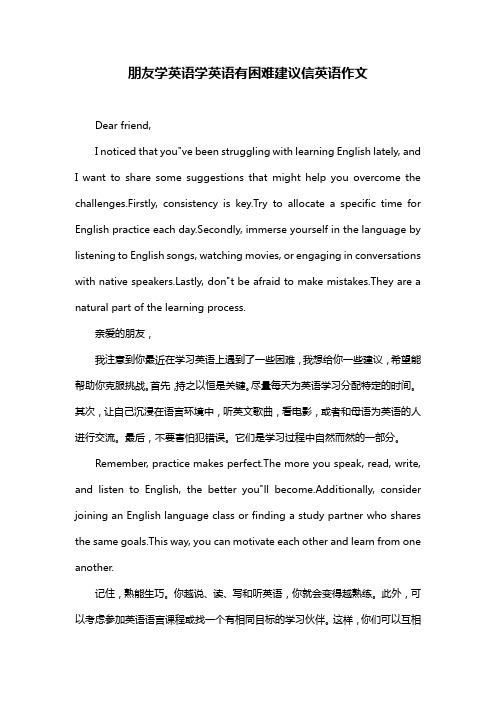
朋友学英语学英语有困难建议信英语作文Dear friend,I noticed that you"ve been struggling with learning English lately, and I want to share some suggestions that might help you overcome the challenges.Firstly, consistency is key.Try to allocate a specific time for English practice each day.Secondly, immerse yourself in the language by listening to English songs, watching movies, or engaging in conversations with native stly, don"t be afraid to make mistakes.They are a natural part of the learning process.亲爱的朋友,我注意到你最近在学习英语上遇到了一些困难,我想给你一些建议,希望能帮助你克服挑战。
首先,持之以恒是关键。
尽量每天为英语学习分配特定的时间。
其次,让自己沉浸在语言环境中,听英文歌曲,看电影,或者和母语为英语的人进行交流。
最后,不要害怕犯错误。
它们是学习过程中自然而然的一部分。
Remember, practice makes perfect.The more you speak, read, write, and listen to English, the better you"ll become.Additionally, consider joining an English language class or finding a study partner who shares the same goals.This way, you can motivate each other and learn from one another.记住,熟能生巧。
- 1、下载文档前请自行甄别文档内容的完整性,平台不提供额外的编辑、内容补充、找答案等附加服务。
- 2、"仅部分预览"的文档,不可在线预览部分如存在完整性等问题,可反馈申请退款(可完整预览的文档不适用该条件!)。
- 3、如文档侵犯您的权益,请联系客服反馈,我们会尽快为您处理(人工客服工作时间:9:00-18:30)。
试试能发贴了么,结果发现能发了,那我就在这里写文吧!
本人介绍:理科,英语四级没过,基础超差,包括最基本单词和语法。
我就是读大学的英语学习最差的人!说自己0基础毫不为过!
于3月开始准备考研,英语58分(上海)。
现将本人复习过程及心得写下,以鼓励惧怕英语而想考研的人!也希望每个有梦的人能够梦想成真!
本人对考研英语的理解:考研就是考单词,考长难句,自认为“得阅读者得天下”
关于单词:四级单词都不会,所以开始抱着本四级单词啃,每天看大量的单词,看的很快,记不下来是正常的,因为大部分都不会!四级单词看了一遍(一周左右)之后就迫不及待的开始看红皮书了,每天1个小时(不是每个单词盯很长时间,而是看了几秒钟不管会不会都跳过,第二天再看,单词不多描述了),就这样每天一个小时一直坚持到了11月份左右,看了不下7遍红皮书,每天,从未间断,11月份之后基本上都会了,但还有不会的,之后是每天一章,大概半个小时。
不多述,单词最重要!
关于阅读:用的是黄皮书,与单词同步开始,刚开始根本看不懂,每天一篇,一句一句的看,每个单词都尽量知道什么意思,开始时大概40-50个单词需要标注,尽量弄清每个长句的语法,尤其主谓宾定。
在这里感谢我女朋友,在过第一遍阅读的时候教我解长难句,教我语法,鼓励我!这样一篇阅读下来大概2-3个小时。
至于多累……谁做谁知道!
我做的9年真题一共39篇,除掉个别特变态的,大概32篇左右,第一遍根本没法做,所以也没看题。
在阅读里可以认识很多单词,有些很简单的,看着眼熟,可是不知道什么意思,查了感觉又没有必要注释的N多。
大概2个月做完了第一遍。
然后第二遍,重新买了本书,第一本太脏了,做法和第一遍一样,还是每天一篇,这次开始做题了,做完还会错很多,做题的时候不能依靠曾经的记忆,答案要在题在正文中的找,对应的那句话找到,几乎每个题都有对应的一句话,题做下来,会错很多……原因-----看不懂题意,找不对对应的句子,找到对应的句子看不懂,理解错误……各种原因,做每篇都会浪费很长时间,做完了,正文再和第一遍一样,弄懂每个词,每句话……这样一篇下来还是2-3个小时!
就这样,30多篇一遍一遍的看!第二遍完了第三遍……每天一篇不多不少!
9月底的时候,至少3遍过去了,基本上看到每篇文章的第一句话就知道整个文章都是什么意思了,不急不躁!还这样做题:阅读,看题,找对应的答案,之后标注不会的单词,分析长难句!其实这是长难句也变的很熟悉了!
这样的一篇阅读一般超不过1个小时了!当然单词还是一个小时!雷打不动!
---------------------------------不要以为你很熟悉了,单词,和阅读,想尝试做其他的吗?------------------------
别做其他的任何东西,本人也尝试过,发现其他的任何人做的题,都和真题不一样,做也没什么用,所以还是看阅读,单词吧,阅读黄皮书,单词红皮书……每天不间断,单词一章,阅读一篇!
关于作文:本人11月下旬开始准备的,买了本新东方的100篇范文,10年的5块钱,盗版的,最便宜的!
先看大作文,每天看不了多少时间,其实好好看也就12月份开始的吧,看那里的范文,找自己认为万能的句子!很多范文没有看的价值,还有黄皮书的01年到11年的范文有几篇是最经典的,看过之后抄下来大概20-30句话,背的很熟,至于背了多少遍……不计其数,反正熟到第一个词说出来就能一口气不加思索的背出一整句话。
然后练习写作,想法设法套用这几句话(不套用我根本写不出来作文,本人语法也太烂,只有这样套用才放心),三段的第一段全套,第二段的套第一句,第三段第一句套,最后一句套,每段的第一句话都很长,一半多于20个单词……
12月中之后开始看小作文,黄皮书的范文和新东方的范文,还是记能套用的万能句,没几句的。
每天英语不少于3个小时,从开始到考试!本人坚持下来了……
关于考试:本人不做完形,因为语法不懂,没基础,也不懂短语,所以没法做,不做,选一个有“AS,SO,HOWEVER,BUT”等表转折的,每篇都有,选之!肯定对(如选A,这样的单词只有一个),其他的全选B或C或D凭心情,翻译本人不会做,语法……反正就是做不出来!原因懒的说了!但是2个题不做,时间省下来了!作文工整,干净!
作文70分钟!阅读每个20分钟!
关于成绩:完形3分(肯定3分最稳得),阅读20个对12个,排序5个对4个,翻译0分,作文23分,总分58。
